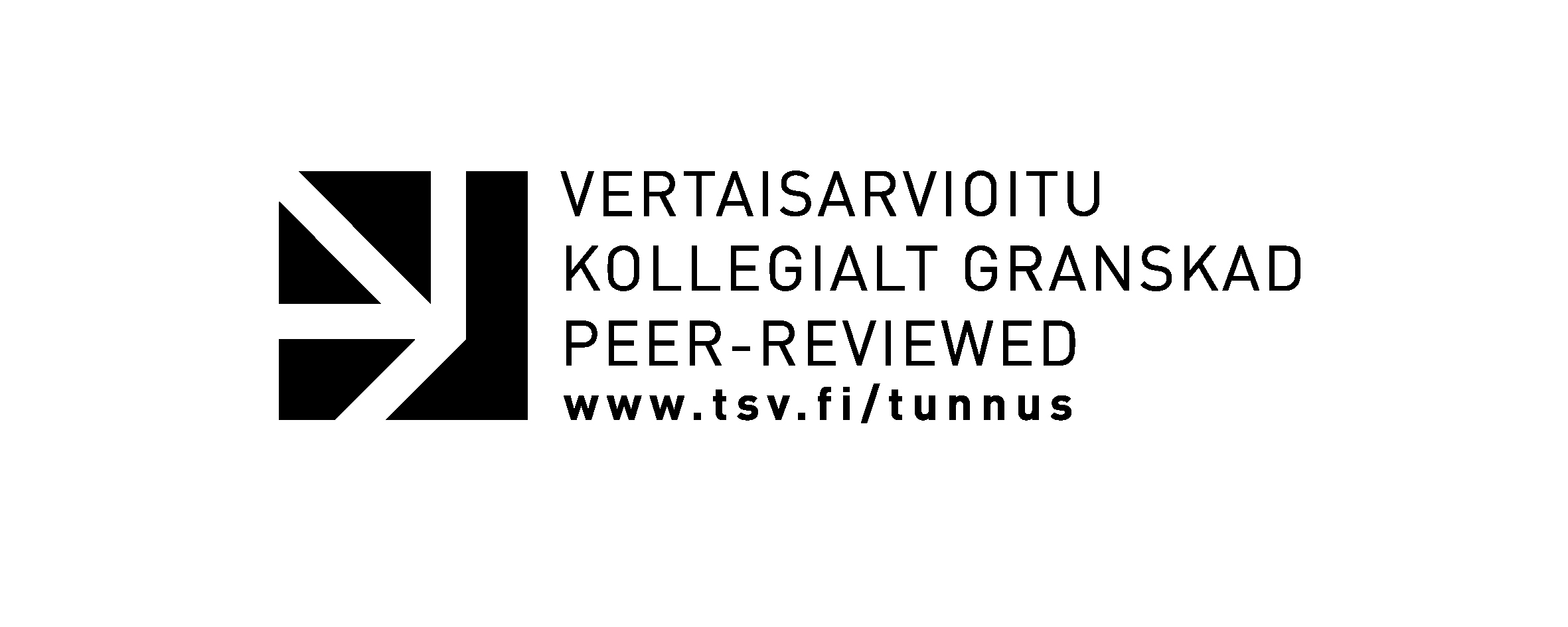Ethnologia Fennica is an international journal of the Association of Finnish ethnologists. The journal publishes original scholarly articles, review articles, congress reports, and book reviews that promote Finnish ethnological research.
Archives
-
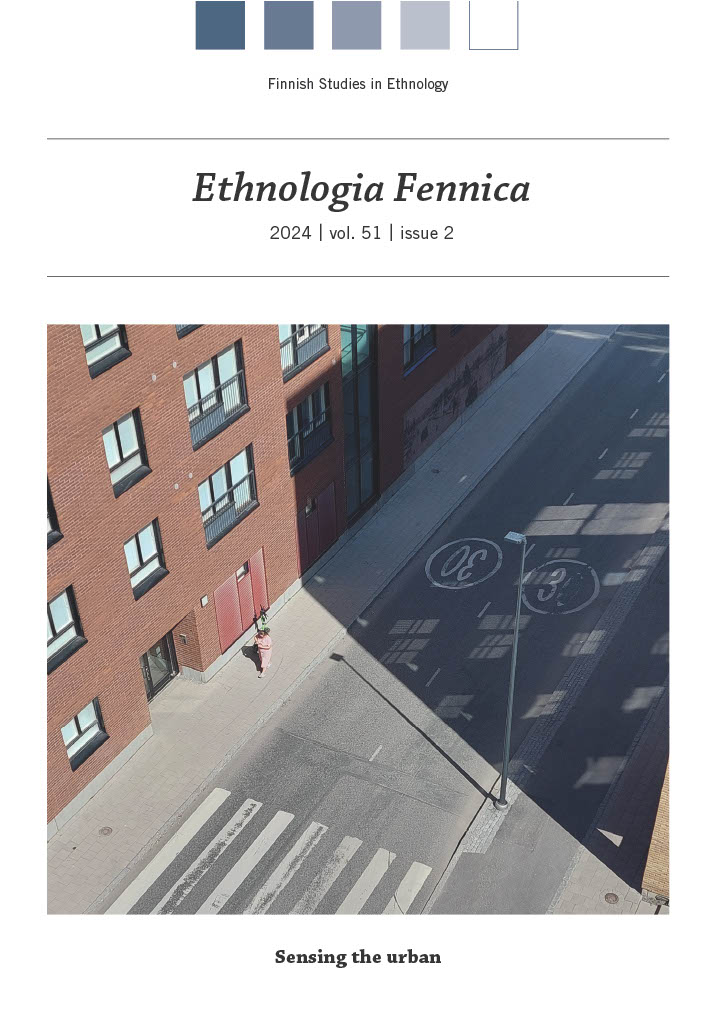
Sensing the Urban
Vol. 51 No. 2 (2024)This special issue of Ethnologia Fennica, “Sensing the Urban”, began to take shape in the discussions of the research group at the University of Turku. The group, consisting of ethnologists, a museologist, and a cultural historian, together studied the designed, experienced, and perceived socio-material well-being in a newly built residential area near the medieval castle of Turku in southwestern Finland. The aim of the research was, on the one hand, to understand the everyday mobility of people living and working in this area and how they engage sensorily with its different kinds of places, materialities and temporalities, and, on the other hand, what sensory experiences could contribute to urban design and planning. So, we decided to invite other scholars to reflect on the importance of sensory urban studies in ethnology and our related disciplines. You can read the results in this special issue.
This issue presents articles that discuss different ways of doing sensory research in urban settings, especially sensory perceptions, knowledge and practices related to the urban environment in the present and through time. This is an important collection of articles, each contributing in its own way to the ongoing discussion about the method and its application in the field of urban research.
In addition to the four thematic articles, this issue also includes an article contributing to the anthropology of dance (still very fitting to the methodological framework of the theme), and lastly; four dissertation reviews and two conference reports.
-
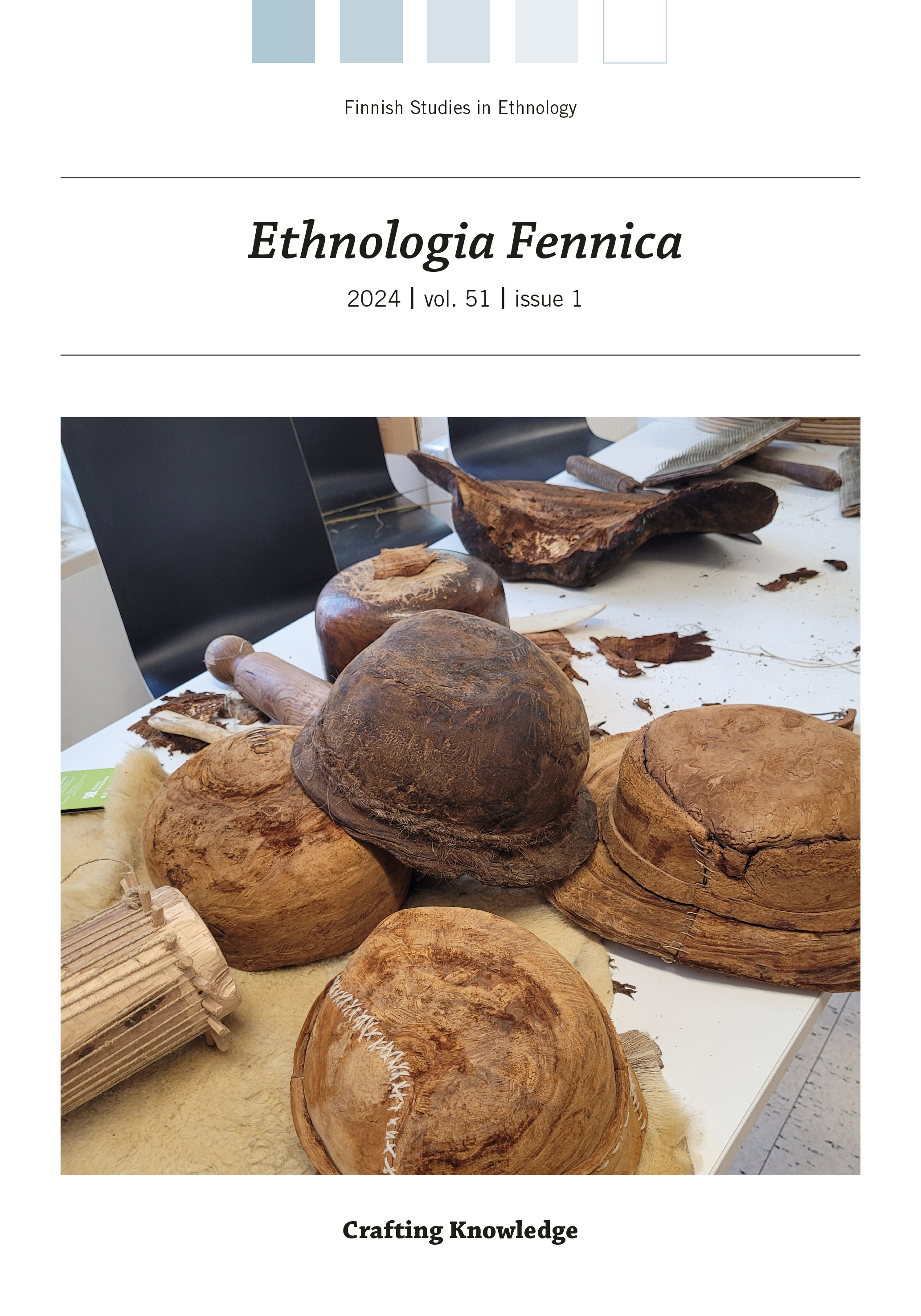
Crafting Knowledge
Vol. 51 No. 1 (2024)Humans are not the only animals that use tools. Nevertheless, using tools is considered one of the fundamental characteristics of the human species. In this special theme issue (1/2024) of Ethnologia Fennica, we present a broad range of articles that deal with crafting, crafting knowledge and creative material practices. What kinds of creative methods have been experimented with, invented and found useful in the material practices of communities and individuals? Furthermore, how have these innovations and different kinds of craft skills in various contexts influenced our societies and everyday life? Finally, how has crafting affected our emotions and values?
The issue includes two research articles that explore the crafting theme from the perspectives of skills and materiality. In many cases, the authors are skilful artisans themselves, and they delve into the different crafting skills through their own experiences and visions. In two review articles, the theme of this issue is approached from the perspective of materiality, sustainability and new, experimental techniques and materials. The issue also includes several book reviews, one conference report and reviews of three rather extensive article collections.
-
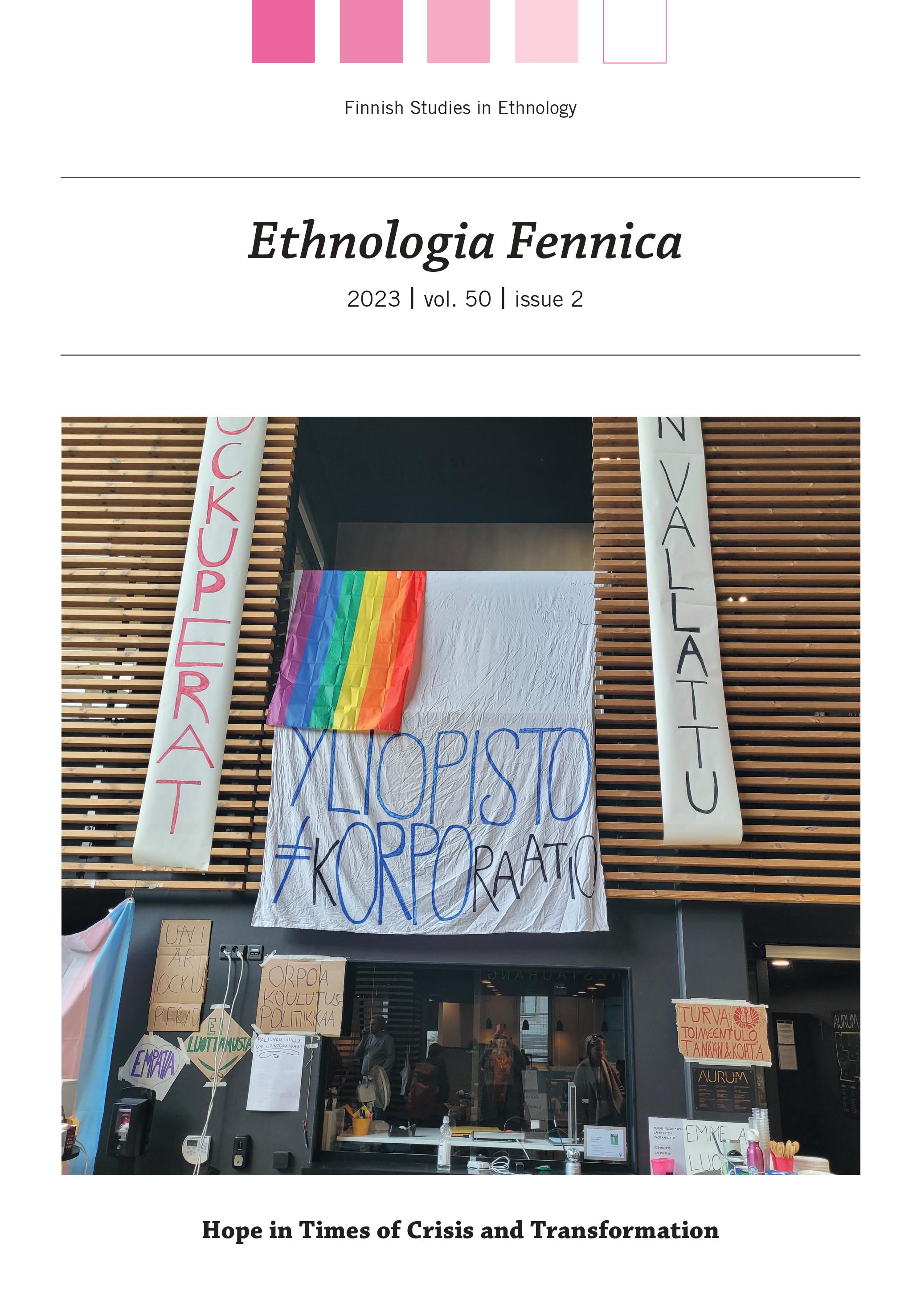
Hope in Times of Crisis and Transformation
Vol. 50 No. 2 (2023)In this theme issue (2/2023) of Ethnologia Fennica, we ask the following questions: Where can hope be found, and how? Under what circumstances does it emerge and flourish? What kinds of narratives are constructed based on hope? In what kinds of personally overwhelming or global crises and transformations can hope help people imagine new alternatives and become resilient and active? The theme issue contains five research articles, two book reviews and three conference reports.
-
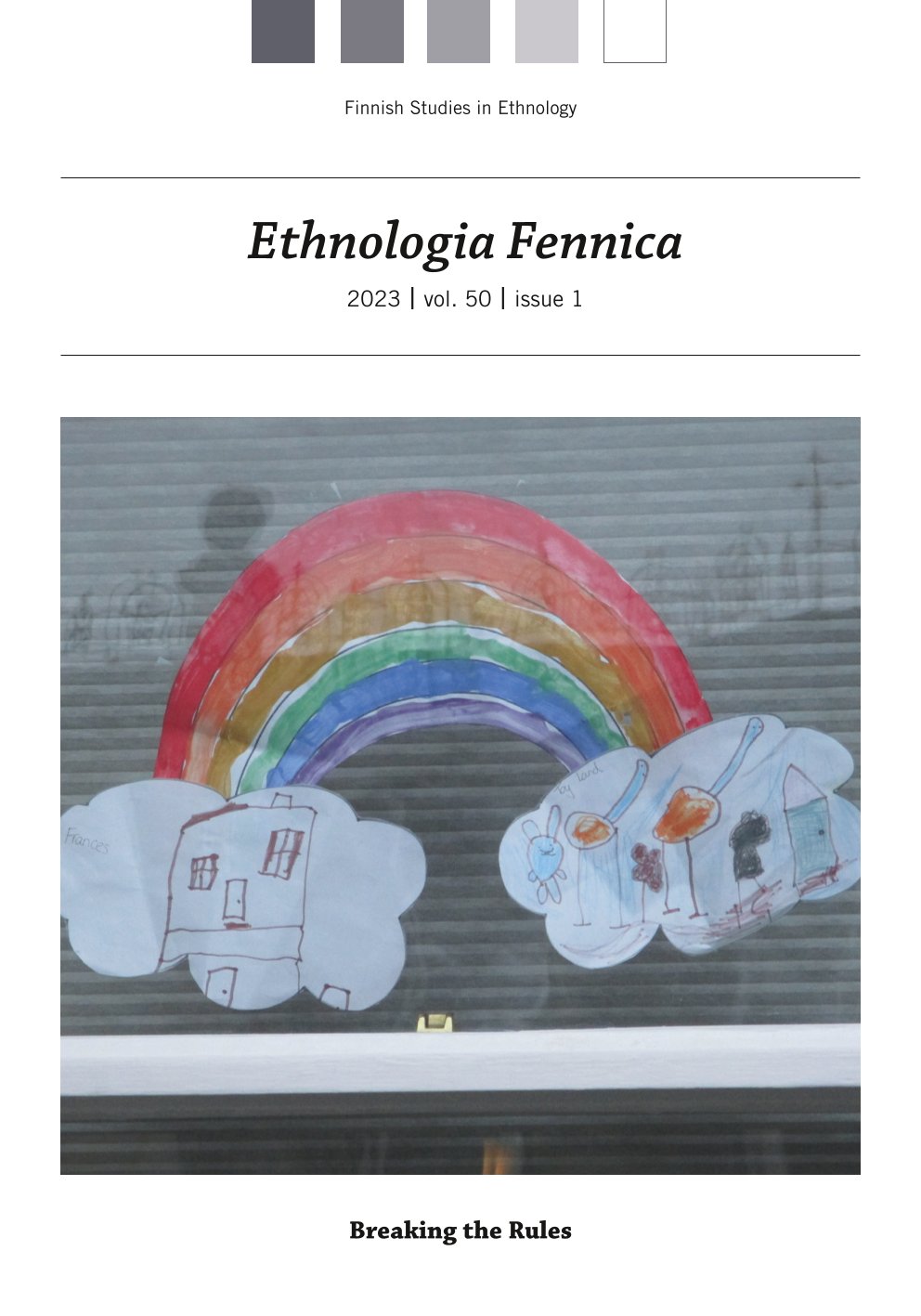
Breaking the Rules
Vol. 50 No. 1 (2023)This volume of Ethnologia Fennica introduces topics addressed at the 15th SIEF congress, held online in June 2021. The event was hosted by the University of Helsinki. The theme of the congress was ‘Breaking the Rules: Power, Participation and Transgression’, bringing to the fore discourses and practices of making, breaking, reinterpreting and transgressing rules. The idea was to examine the implications of ‘breaking the rules’ in various social, economic, political, cultural and academic contexts. This special issue of Ethnologia Fennica has been edited by visiting editors Eerika Koskinen-Koivisto, Hanna Snellman and Tiina Suopajärvi.
-
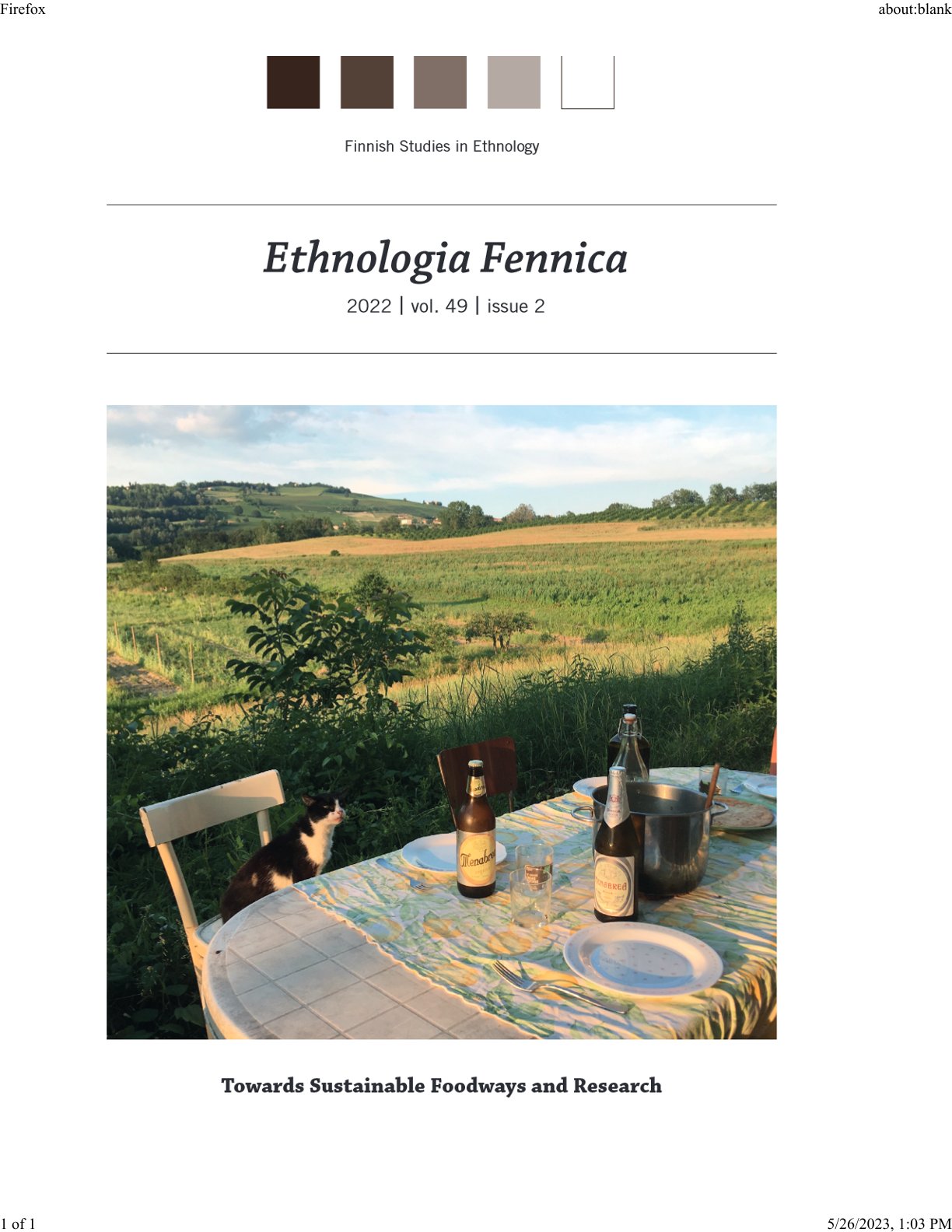
Towards Sustainable Foodways
Vol. 49 No. 2 (2022)Special issue of Ethnologia Fennica explores sustainability-related transgressions and contestations in various parts of the food system, looking for more sustainable foodways and offering guidelines for future research. This thematic issue draws inspiration from the panel and from the round table ‘Braking norms and traditions in pursuit of sustainable food ways’ discussion held at the SIEF 2021 congress: Breaking the rules? Power, Participation and Transgression. The panel discussed the pursuit of sustainable foodways and related norm-making and norm-breaking practices, asking the following question: ‘What kinds of transgressions are, and are not, made when seeking more sustainable foodways?’ The panel and roundtable discussion built on the idea that the pursuit of a sustainable future involves the breaking of old food-related rules, the making of new ones and the bending of both. The aim of the roundtable was to encourage further discussion on whether and how ethnologists can participate in the pursuit of sustainable foodways. By mapping the past, present and future state of the ethnological study of food and sustainability, this issue continues these discussions.
-
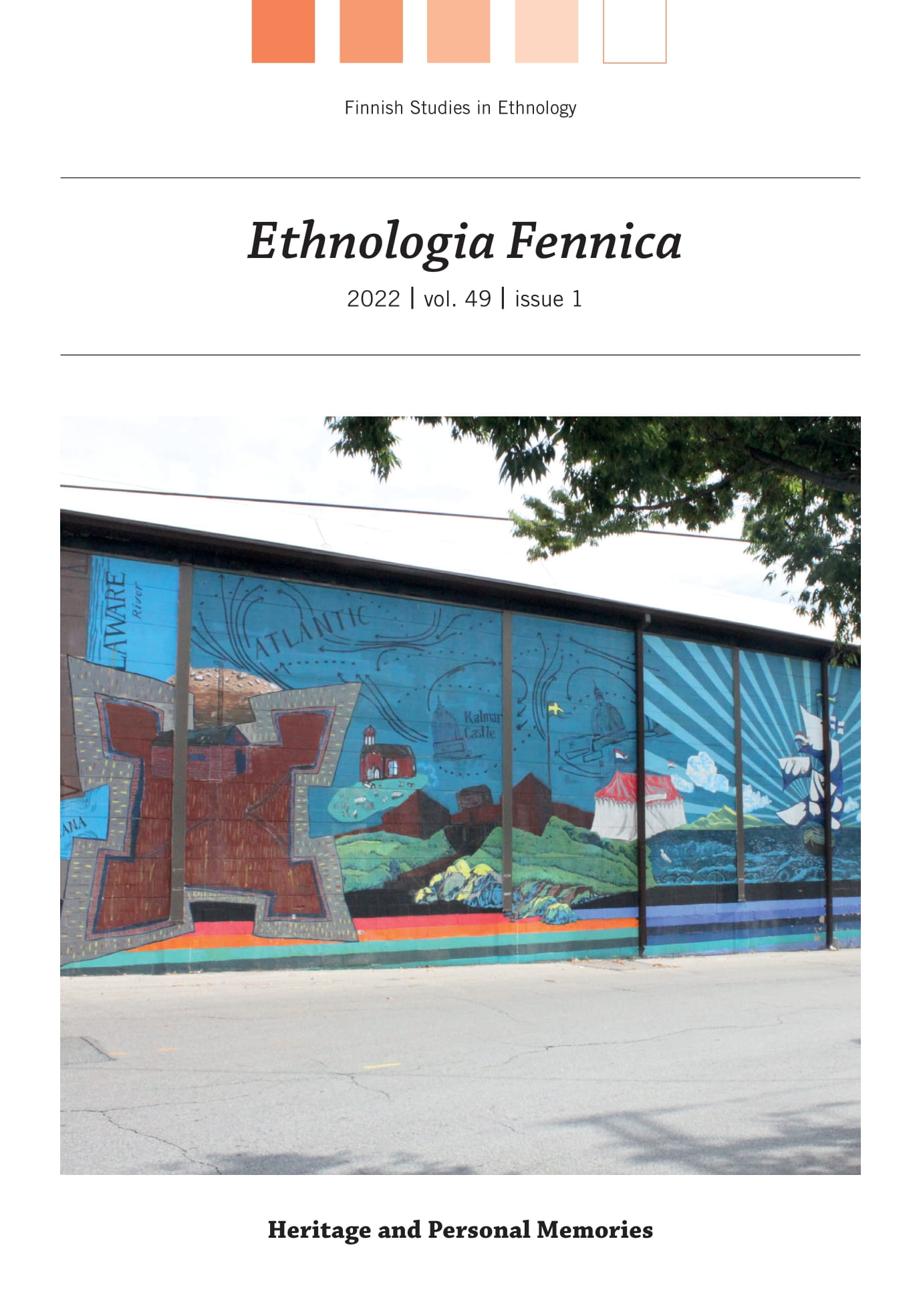
Heritage and Personal Memories
Vol. 49 No. 1 (2022)The theme of this Ethnologia Fennica 2022 issue (vol. 49:1) is the shaping and representing of individual lives and memories in the context of heritage and heritagisation. Today, heritage and cultural institutions such as museums and archives are well aware of their social and political role and strive to increase ecological, cultural, and social sustainability. Therefore, they constantly seek more democratic practices with respect to how people and communities are represented and by whom. One way of achieving these objectives is to increase the use of oral history and life writings in public history activities.
In our themed call “Heritage and Personal Memories” we asked for articles discussing various ways of using oral history and personal memories in public history activities and participatory processes. We were interested in how applied ethnographic work and ethnological research affect these activities.
-
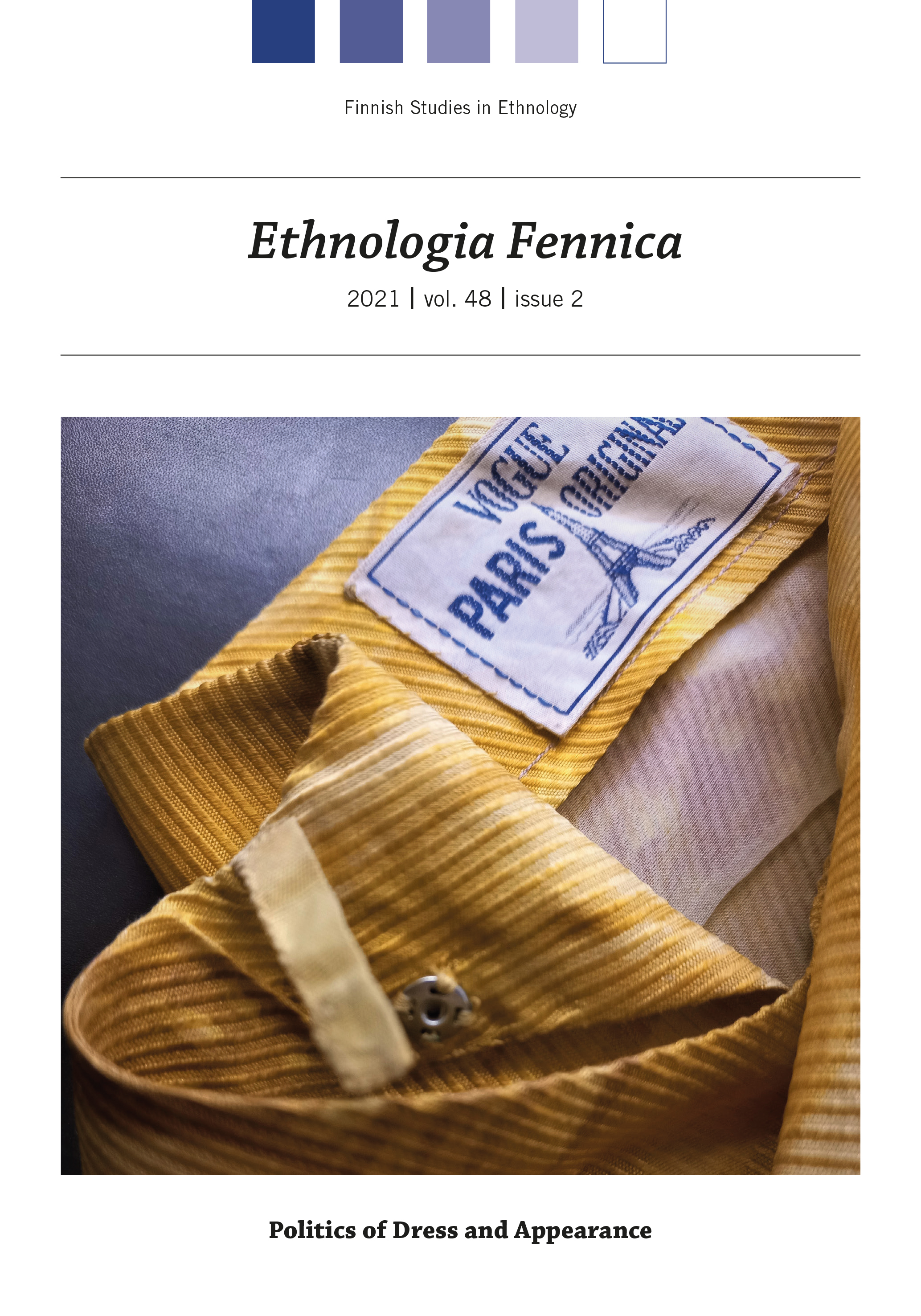
Politics of Dress and Appearance
Vol. 48 No. 2 (2021)Dress has been a typical subject of ethnological research since the establishment of the field. In recent years, new theoretical discussions, and concepts such as performativity, materiality, and body as well as studies inspired by gender theories and textual, visual, and affective approaches have renewed the study of dress in ethnological research in many ways. At the same time, dress, fashion, and appearance have also become very topical themes in the study of culture and society in fields outside traditional dress and fashion studies. The articles of this theme issue discuss the politics of dress and appearance. They analyse the role of dress and fashion in expressing, formulating, and contesting various political ideas and ideologies, social norms, cultural ideals, and social statuses.
-
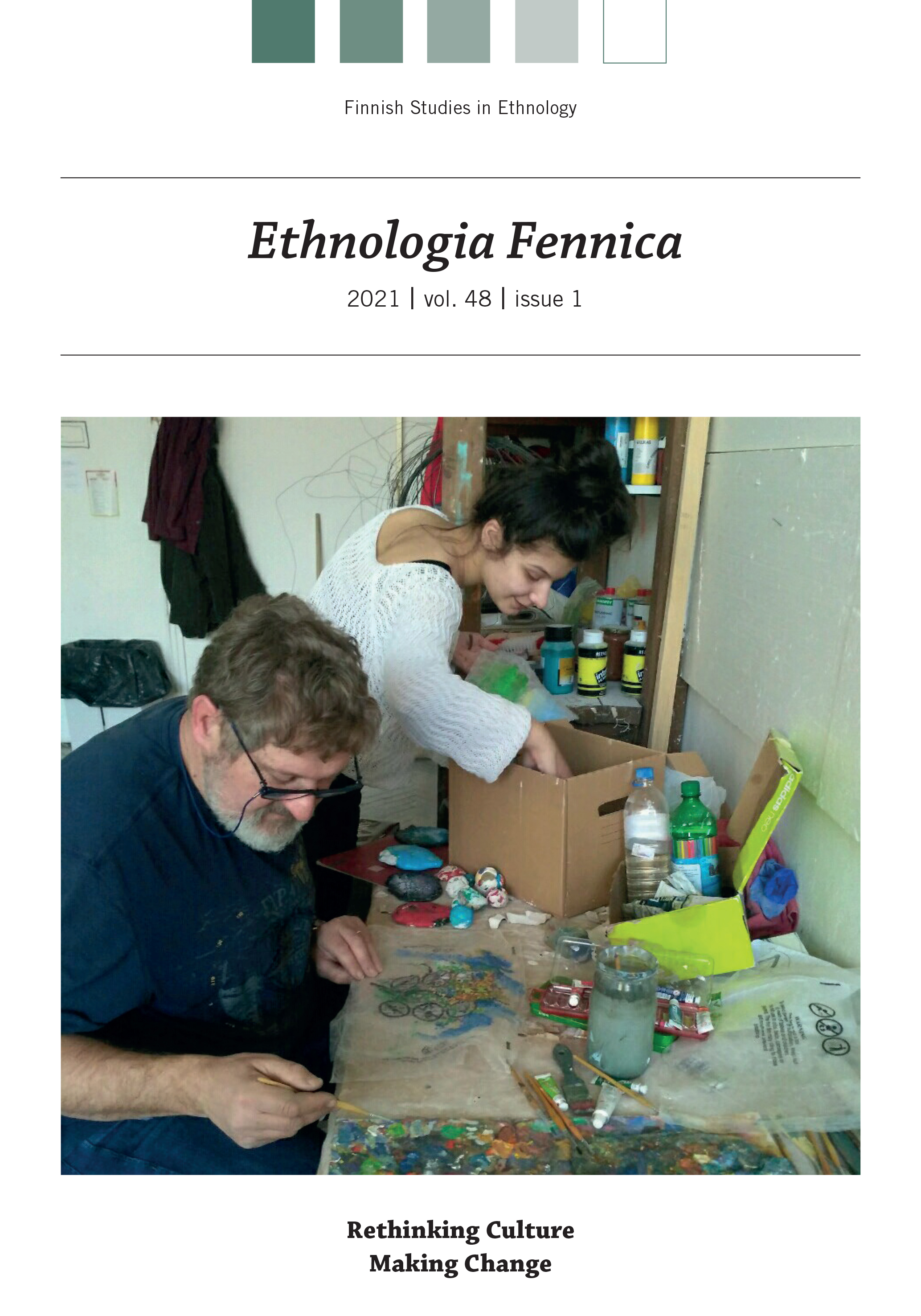
Rethinking Culture - Making Change
Vol. 48 No. 1 (2021)In our themed call Rethinking Culture – Making Change, we asked for articles discussing various ways of making change through applied ethnographic and ethnological research, or texts that discussed diverse ways of making an impact on society and academia based on the participation and collaboration of various interest groups in research.
-
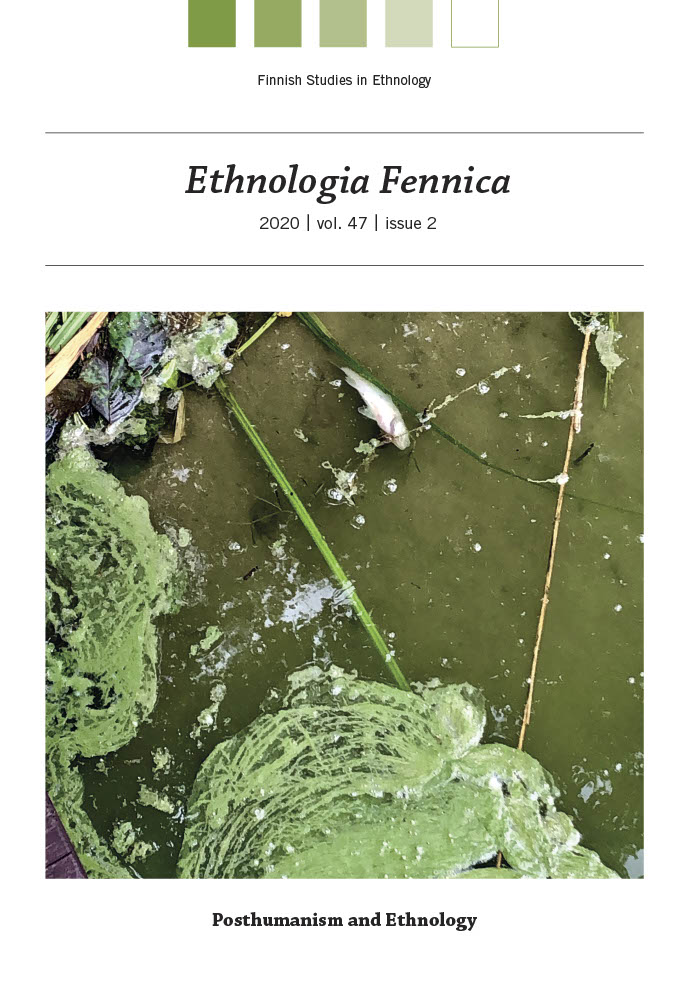
Posthumanism and Ethnology
Vol. 47 No. 2 (2020)This thematic issue of Ethnologia Fennica discusses the intersections of ethnology and posthumanist theories and approaches. The central idea of posthumanist theoretization is to displace the human being from the central position in the universe and highlight that more-than-human entities have strongly affected the formation of humanity. Posthumanist thought rejects the classic humanist divisions of self and other, mind and body, society and nature, human and animal, organic and technological, and it encourages to think relationally and direct research interests to the non-human realm.
-
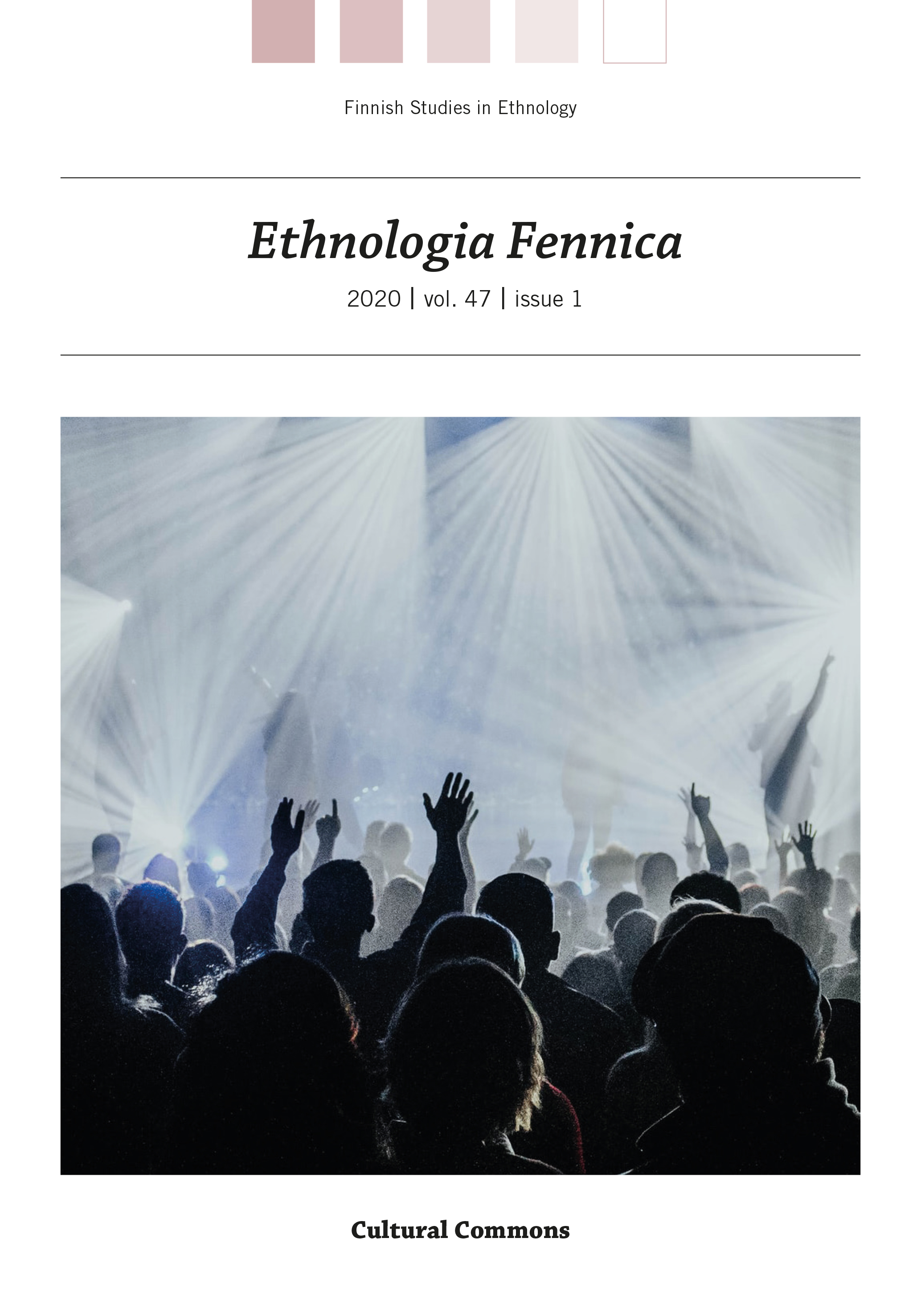
Cultural Commons
Vol. 47 No. 1 (2020)This thematic issue of Ethnologia Fennica is devoted to scrutinising cultural commons. The authors introduce topical viewpoints off the beaten track of the much-discussed topic of open culture and accessibility of collections in the GLAM (Galleries, Libraries, Archives, Museums) sector. The articles discuss ownership, sharing and creativity both through cases that illuminate contemporary discussions and through historical case studies. The articles cover themes from the possibilities and problems of the notion of cultural appropriation in music and literature to aural commons. The authors are not so much interested in the possible adverse consequences of the media and regimechanges; rather, they trace the different forms and practices surrounding the ideas of sharing resources and regimenting it.
-
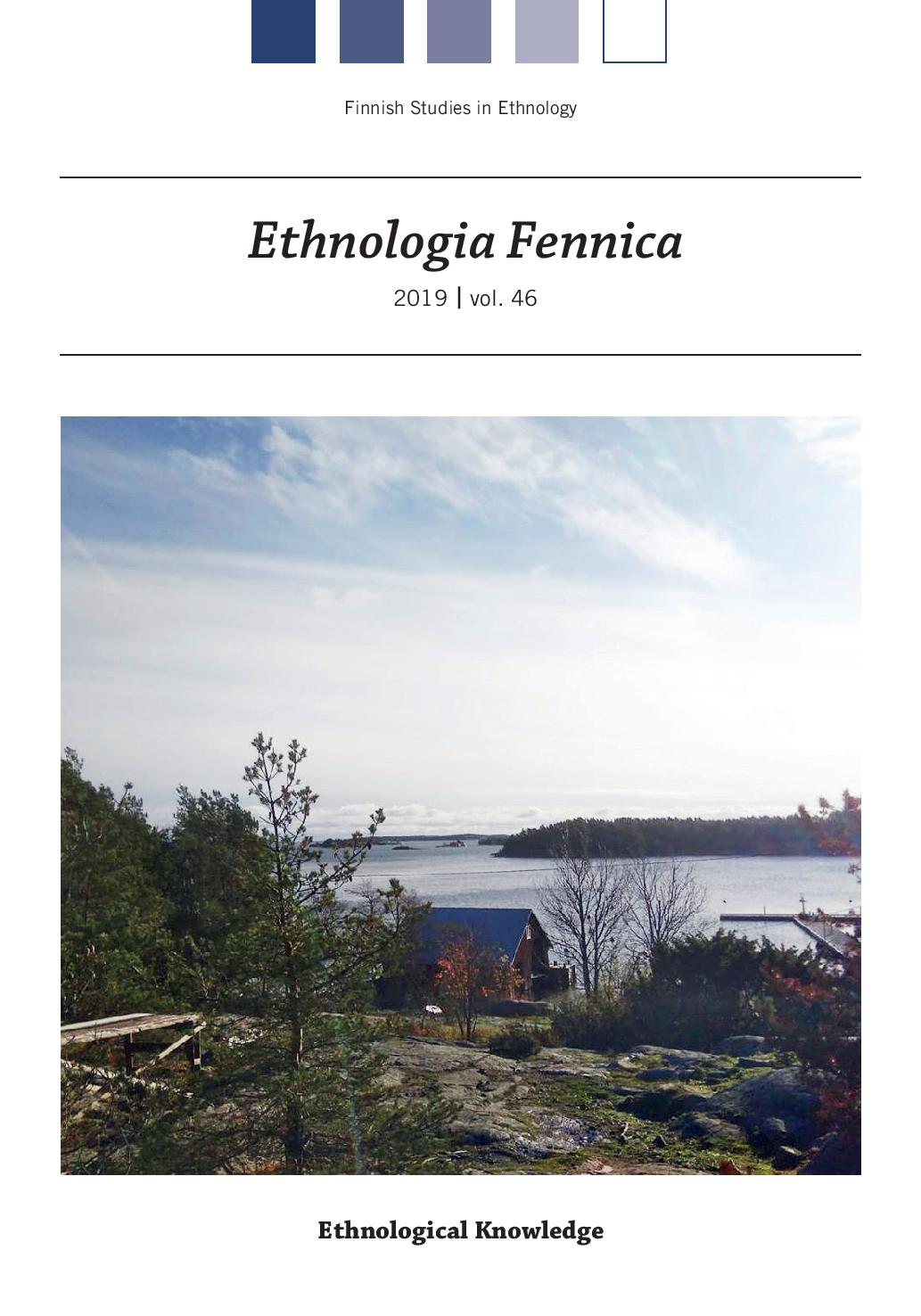
Ethnological Knowledge
Vol. 46 (2019)The theme of Ethnologia Fennica 2019 volume is Ethnological Knowledge. The five articles in the issue introduce perspectives into contemporary societal issues and processes of change at personal, local, national, and international levels. Based on their research results, some authors make suggestions for more humane and inclusive policy-making or practices that would decrease discrimination and improve transparency. Other texts introduce new methodological and conceptual approaches that involve subjective experience and vernacular regimes of knowledge. One of the articles examines negotiations about the ways in which different professionals and those who are unemployed think about the value of their work and skills as well as their place in the rapidly changing world. We also learn about how labeling and categorizing works in the context of normative and stigmatizing sexual identities, as well as about cultural heritage policy and processes of heritigization. In addition to these texts, this issue includes four conference reports, including a report on this year’s highlight, the 14th SIEF congress in Santiago de Compostela and on other interesting events. The volume features also with four book reviews.
-
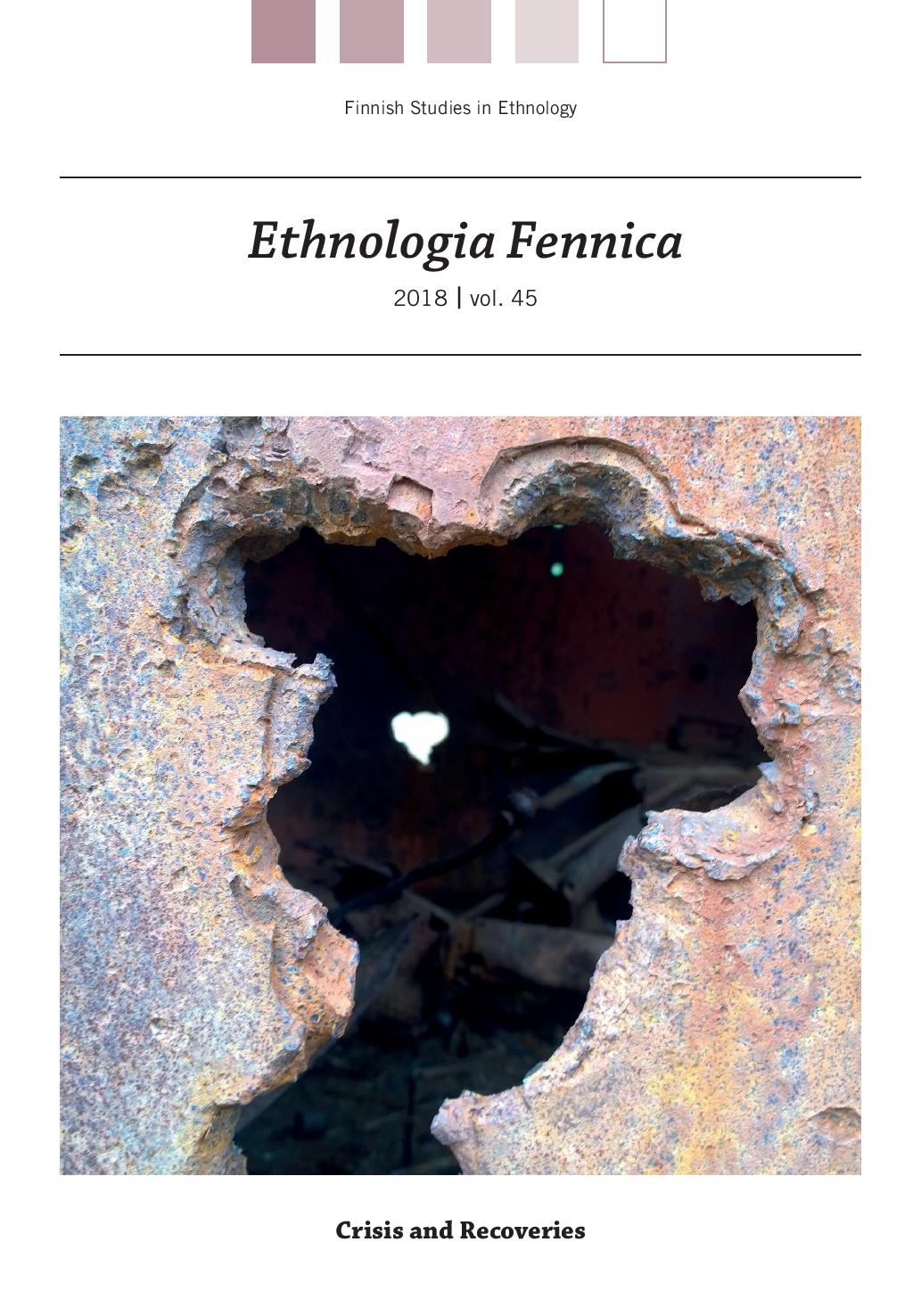
Crisis and Recoveries
Vol. 45 (2018)The current volume (45) of Ethnologia Fennica focuses on the theme “Crisis and Recoveries”. The three articles published under the theme approach the war and crisis from new perspectives: those of personal narratives and various groups of civil society such as children who have long been excluded from standard historical memory. They also concentrate on the recovery side of crisis: they ask how individual persons and communities have recovered from the crises caused by or related to the war, and how the crisis are commemorated and reinterpreted. Additionally, the articles pay attention to the experiences of the younger generations who have no personal memories of the events but whose lives have been affected by the war and especially by the silences and tension surrounding it.
-
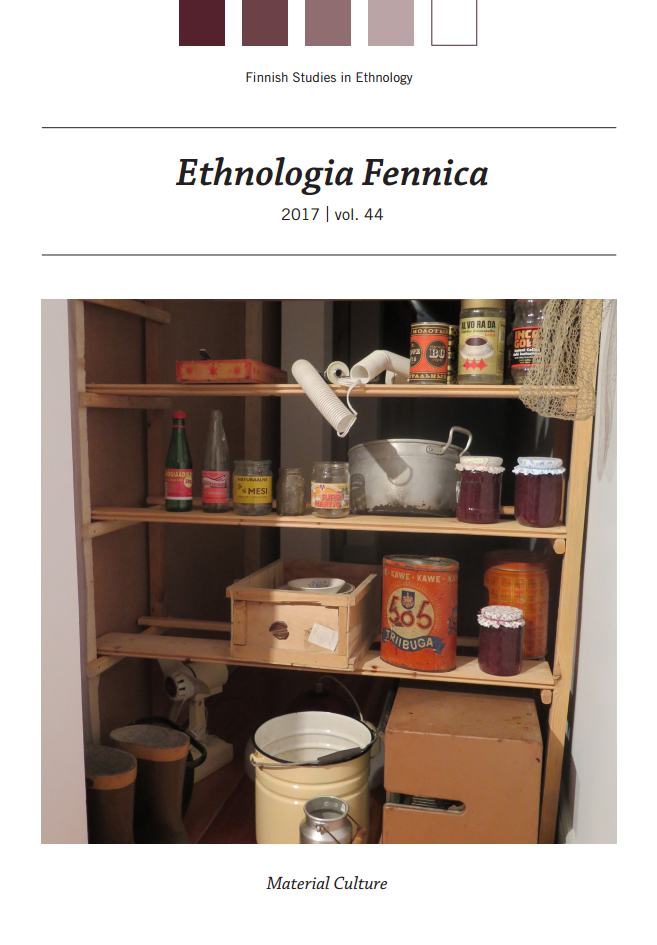
Material Culture
Vol. 44 (2017)The study of material culture is one of the core fields that characterize ethnology as a discipline. This year’s volume of Ethnologia Fennica presents contemporary ethnological research on material culture.
This volume of Ethnologia Fennica is the last volume published in print. Starting from the next volume (vol. 45), Ethnologia Fennica will be an electronic open access journal published in Open Journal Systems. The journal’s electronic archive also includes several EF’s previously published volumes. The journal’s new management and publishing service is provided by the Federation of Finnish Learned Societies and it was launched in 2015. Thanks to the technical and other valuable support from the Federation of Finnish Learned Societies and to the funding granted by the Emil and Lempi Hietanen fund of the Seurasaari Foundation, the transition has progressed smoothly, and Ethnologia Fennica is now able to step into the age of open access journals.
-
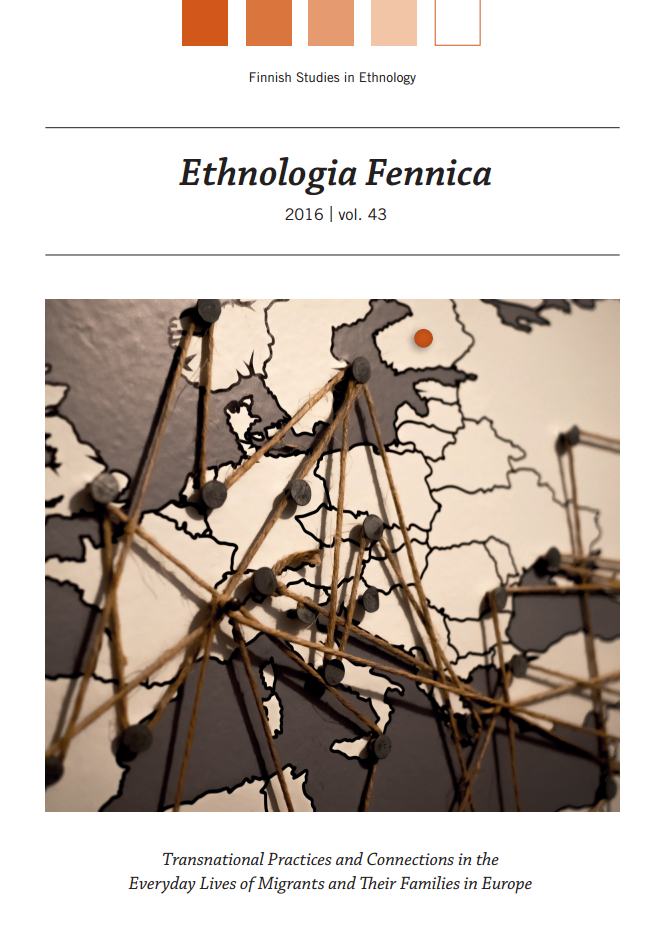
Transnational Practices and Connections in the Everyday Lives of Migrants and Their Families in Europe
Vol. 43 (2016)The themes in this issue of Ethnologia Fennica are transnational practices and connections in the everyday lives of migrants and non-migrants in Europe. The theme issue originates from a seminar titled “Transnational Processes and Practices among European Diasporas – Ethnological and Anthropological Approaches” held at the Department of History and Ethnology, University of Jyväskylä, Finland, in November 2013. The purpose of the seminar was, first, to bring together recent international research in ethnology and its sister disciplines, and second, to trace out how transnational and translocal perspectives have been utilized and understood in these disciplines when studying migration in contemporary multicultural European settings. An open call for articles focusing on these questions was issued in 2015. Scholars were encouraged to write articles about migrant individuals’ or groups’ transnational and translocal practices, social networks, and/or social ties and responsibilities which are closely linked to everyday life.
-
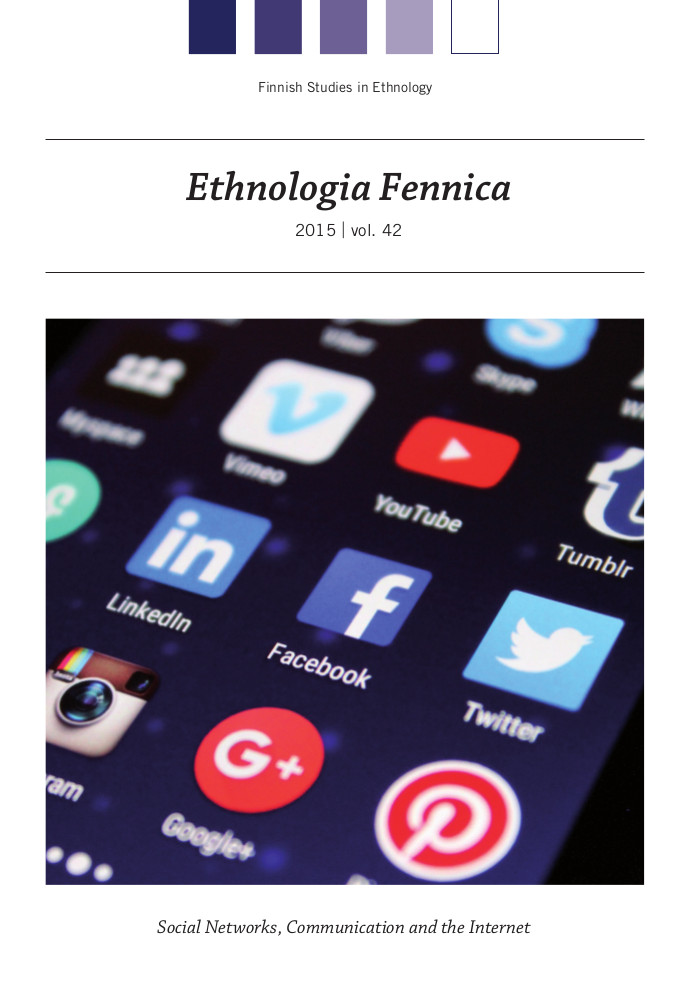
Social Networks, Communication and the Internet
Vol. 42 (2015)The internet has changed our lives within just a few decades: we watch TV, pay our bills and fill in our tax forms, book appointments and hotel rooms, look for recipes, communicate, form networks and share our everyday lives on the internet. It would actually be easier to list what we cannot do on the internet rather than list what we do or could do on it. For example, sociologist Christine Hine (2015) has noted that the internet is embedded in our daily lives, cultures, social interactions and economies to the extent that it should no longer be considered a curiosity. The call for papers in Ethnologia Fennica 2015, volume 42, asked writers to discuss how internet-related communication and social networks are studied and discussed in contemporary ethnological research.
-
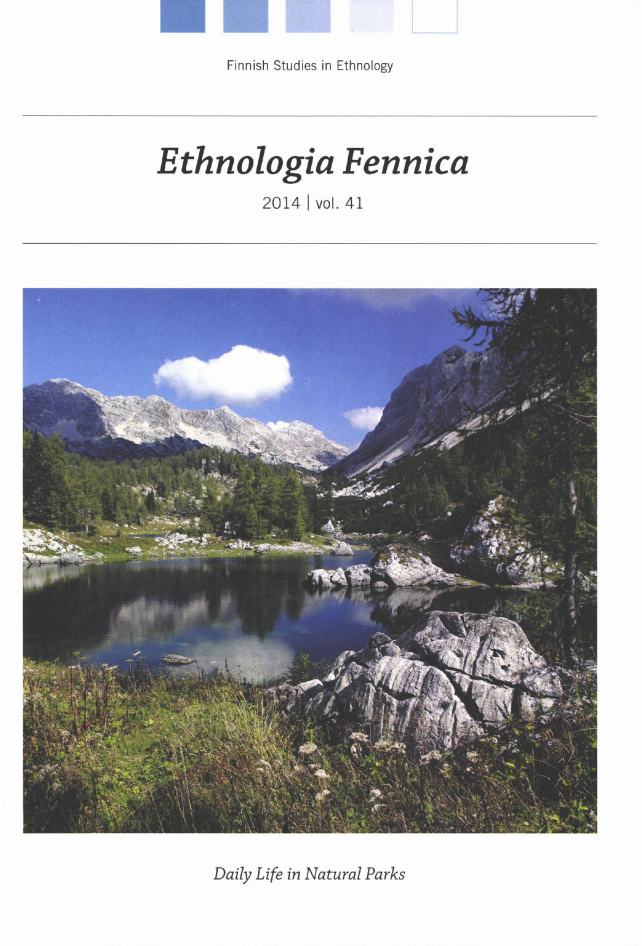
Daily Life in National Parks
Vol. 41 (2014)Guest editors: Jurij Fikfak, Tatiana Bajuk Senčar & Katriina Siivonen
This issue of Ethnologia Fennica is centered on daily life in national parks in Europe and on the varied actors, relationships, activities, and strategies that shape the cultural specificity of the everyday as a social and cultural process. The inspiration for this issue was the panel organized for the SIEF biannual international conference (Société Internationale d'Ethnologie et de Folklore - lnternational Society for Ethnology and Folklore) held in 2013 in Tartu, Estonia. The panel, organized by Jurij Fikfak and Tatiana Bajuk Sencar, was titled "Structures of daily life in national parks: between theory and practice," and presenters shed light on the culturally significant issues that shape daily life in a number of parks across Europe.
-
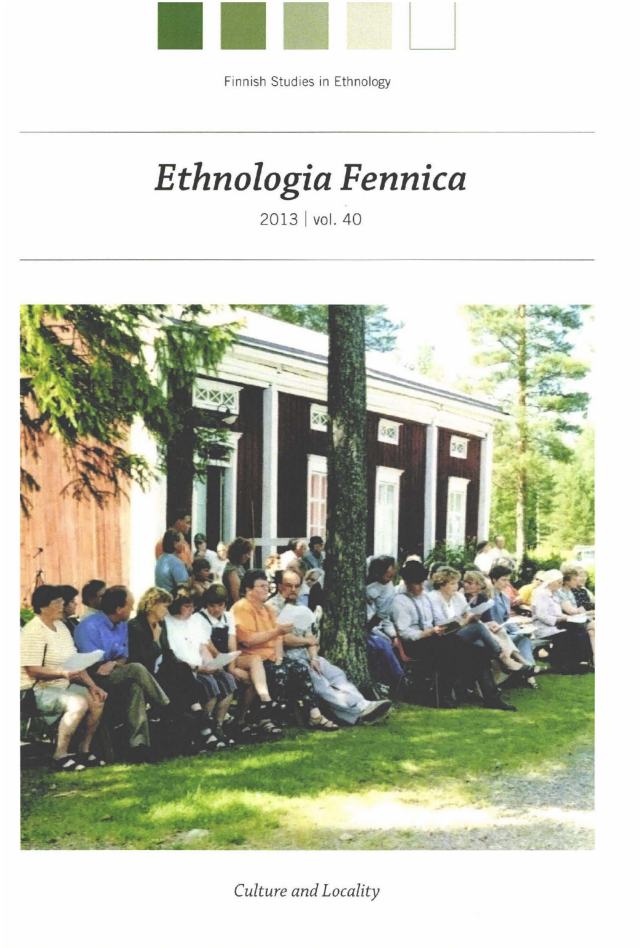
Culture and Locality
Vol. 40 (2013)The call for articles for this issue of Ethnologia Fennica specified no particular theme. The intention was to give as many ethnologists as possible the chance to offer their articles for publication. As befits modern research trends, the articles shaped the subject matter of the issue - broadly speaking - into Culture and Locality. Cultural rcsearch on locality has been a common thread running through the historyofethnological research and one which has also been visible ever since the early years of Ethnologia Fennica. The need to attach oneself to something, a concrete location, a home region and its history, people who stand for similar principles, work for similar goals and possess similar mentalities, is still important for building and strengthening people's emotional well-being and identity.
-
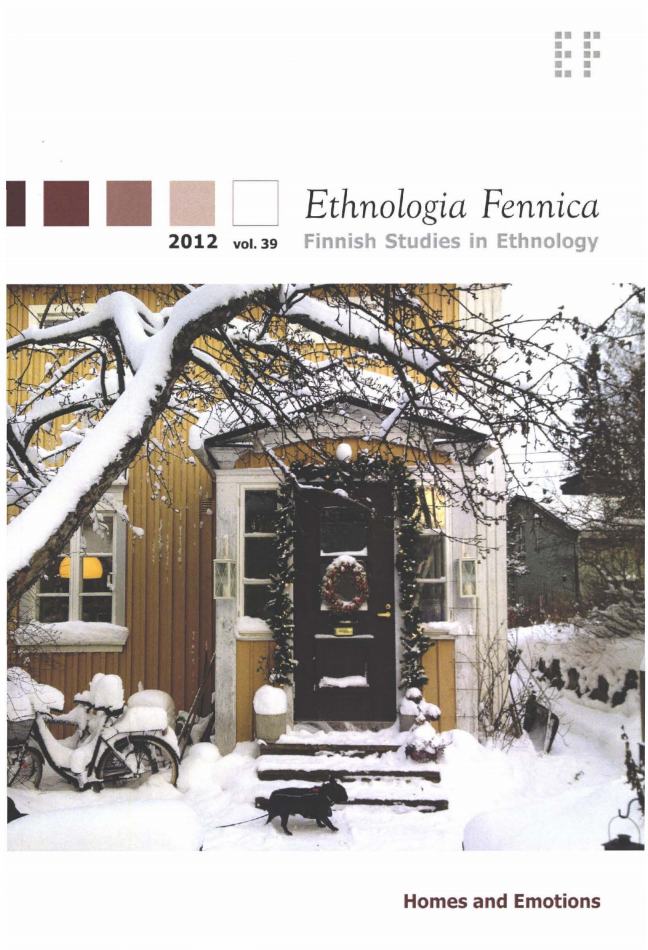
Homes and Emotions
Vol. 39 (2012)'Home' is a multidimensional concept and phenomenon. Just as places get new meanings through personal experiences, a dwelling is transformed into a home through actions and repetitions, through the special meanings that are connected to a place. What is important in the process in which a place becomes a home is the fact that the dweller has the possibility to rework her or his environment and to break the repetitions in it, to have autonomy and functional freedom over the place. A home can be defined as a combination of physical space and the artefacts and atmosphere in it, including the dwellers and the relationships between them. To be a home a dwelling needs its dwellers, and in this sense the concept itself is dynamic by nature.
-
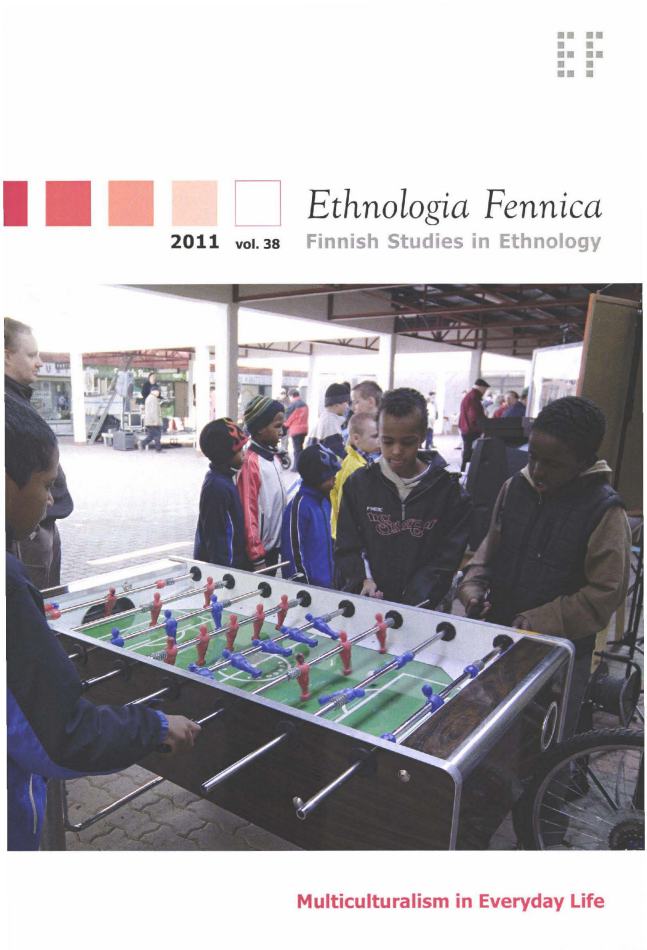
Multiculturalism in Everyday Life
Vol. 38 (2011)During the early 2000s, multiculturalism has been ubiquitous both as a concept and as an everyday phenomenon in Finnish and European discourse. This development has also been mirrored in ethnological research, in its perspectives, concepts and theories. Multiculturalism, however, is a challenging concept for research owing to its popular and multi-faceted nature. Moreover, it can take on socio-political connotations even during the research process. And behind the concept of multiculturalism lie a variety of other phenomena.
-
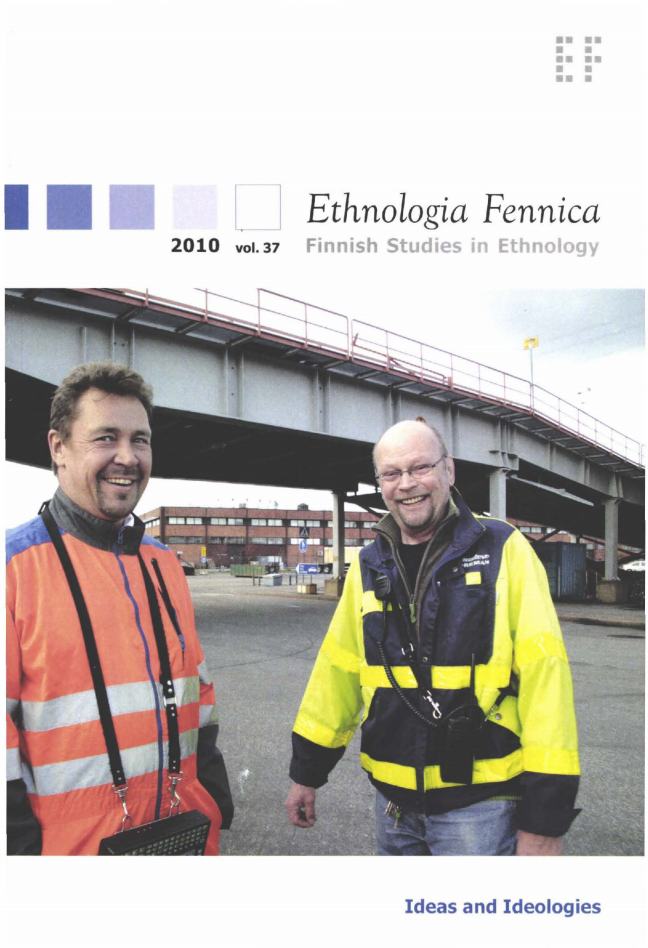
Ideas and Ideologies
Vol. 37 (2010)Ideas and ideologies have in different ways always been present in the traditional subjects of ethnological research. However, only recently have such connections been seen as relevant research questions to be put forward and analysed in ethnological studies. The basic value of research was supposed to be objectivity. In order to be scientific researchers were required to stand outside their research topics and fields and to carry out their research as neutral observers. This assumption was reflected both in the topics researched as well in the ways researchers approached and dealt with these topics. The time when ethnologists would come to regard themselves as part of their research and, as such, would feel obligated to engage in self-reflection was still to come. In its most basic form, this change has been visible in how ' I', the researcher, is present in her or his texts. lt may be self-evident to present-day ethnologists that ethnological research should be understood as socially constructed and, as such, as political and committed to certain ideas and ideologies. However, recognising these elements in research is only the first step in attempting to analyse the 'currents' present in and affecting ethnological research.
-
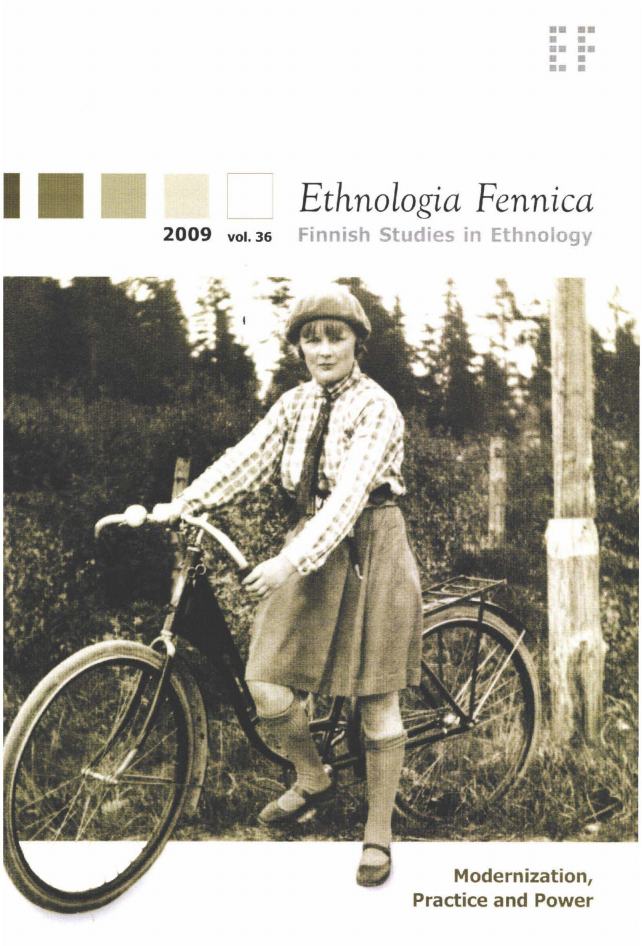
Modernization, Practice and Power
Vol. 36 (2009)The theme in this volume of Ethnologia Fennica is empowering practices and the modernization of the Finnish countryside. All the articles are based on the studies conducted in two research projects led by Professor Laura Stark. ln the introductory article, she outlines theoretical starting points, concepts and objcetives shared by the writers of the articles. The Finnish countryside is connected through changes taking place between the mid-19th century and the 1960s, as the predominantly agrarian country shifted towards an industrialized and urban society.
-
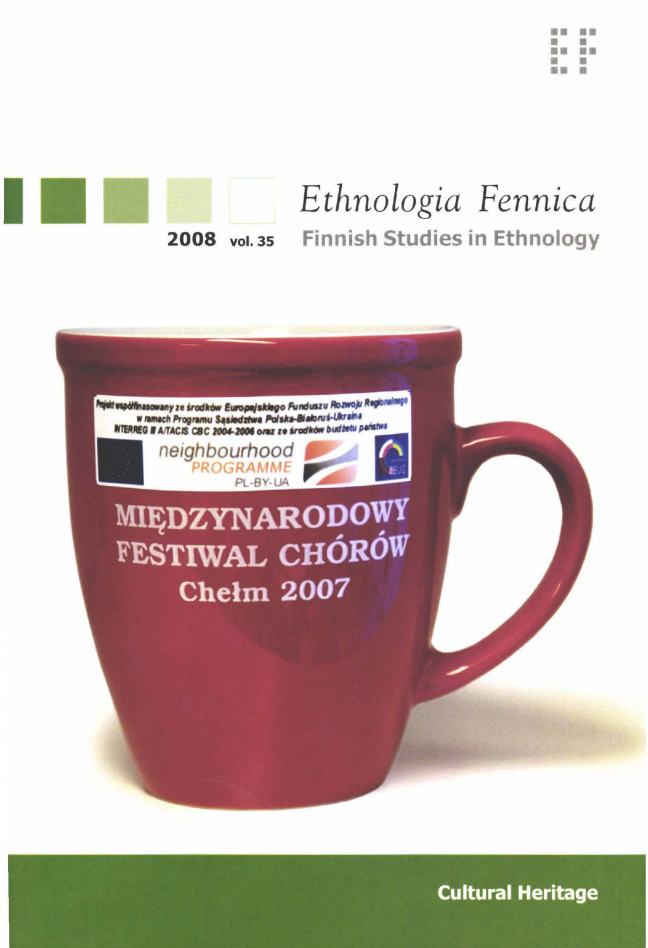
Cultural Heritage
Vol. 35 (2008)The material creations of human beings, such as buildings, objects and works of art, are visible expressions of cultural heritage. Apart from these concrete manifestations, cultural traditions and practices passed from one generation to the next form a collective cultural heritage that guides people's behaviour. This heritage manifests itself for example in customs, models of behaviour, oral and written tradition, rituals and rites. Through our actions, we participate in the perpetuation and also renewal of cultural heritage in various ways. Our culture changes constantly, and in order to construct our cultural identity in the midst of this change we need knowledge of our cultural heritage. Thus cultural heritage helps us to situate ourselves in time and space.
-
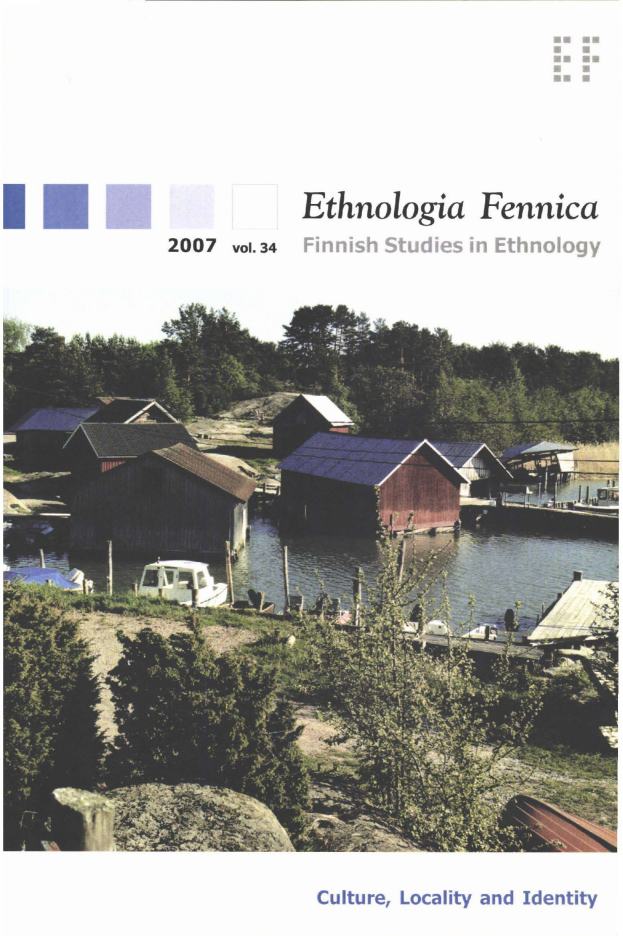
Culture, Locality and Identity
Vol. 34 (2007)Ideas and images of what is deemed culturally valuable spring, on the one hand, from objects and values that are nationally respected and, on the other hand, from connections that are based on meanings attached to locality and identity. However, one should not experience the evaluation of cultural heritage only in an ossified way, as idolization of aspects of the past. lnstead, what is culturally valuable should rather find its place in modern cultural contexts. The western, modern way of life is generally characterized as being focused on individualism and individual goals, from which the "togetherness" of the past has entirely disappeared. Seen from the point of view of cultural and ethnological studies, the experience of solidarity alongside individualism is part of the elevation and evaluation of locality and identity that acts as a counterpoise to the supposedly levelling effect of globalization. Our recognition of the significance of our own national and local cultural heritage can also be the foundation from which we can learn to understand and respect people who follow different cultural values, ideals and customs in their lives.
-
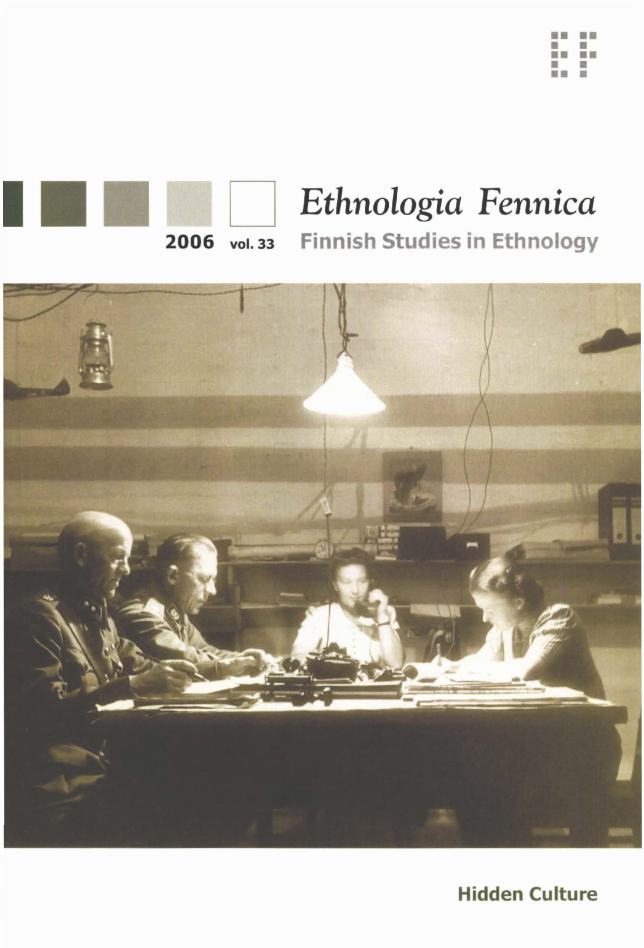
Hidden Culture
Vol. 33 (2006)The activity of humans as cultural beings is bound to conventional customs, praxis and communally accepted values. ln order to act as a cultural member a human must also strive to abide by these rules. Culture is on the one hand visible and on the other hand contains elements and parts that are concealed and hidden. Culture and its attendant aspects do not open up and reveal themselves the same way for everyone. As some things are only known by a rare few, some cultural elements can also remain concealed, unnoticed and forgotten. They can also be purposely concealed within, for instance, political, social or canonized cultural values and defended as such. However, culture and its values and customs are not static and should therefore not be evaluated solely from a current perspective. Nonetheless, the unravelling of a hidden culture can - and this usually requires temporal distance - promote the understanding of past events that have previously been seen as contentious and contradictory.
-
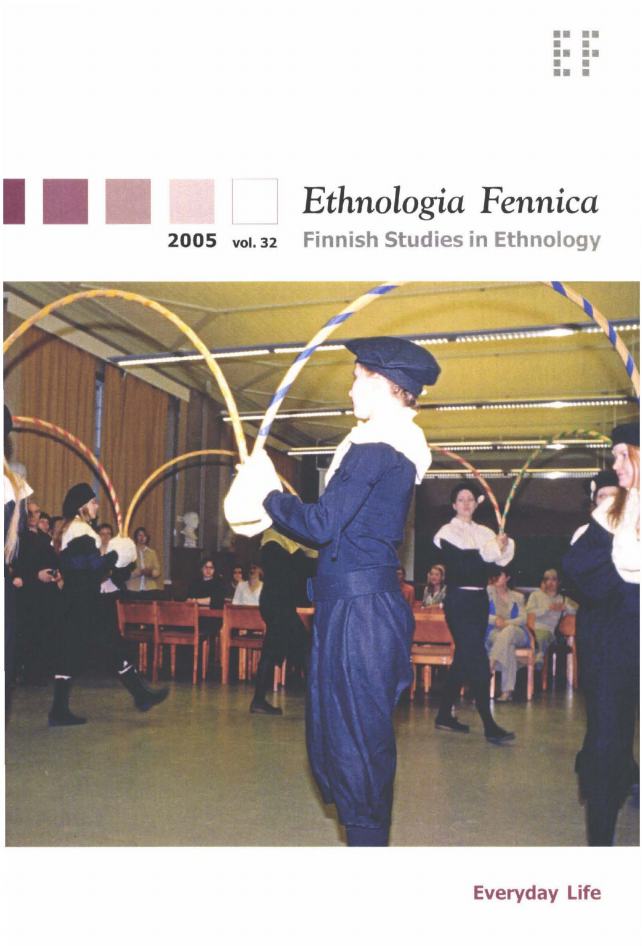
Everyday Life
Vol. 32 (2005)One field of research in ethnology is the everyday life of so-called ordinary people: how one lives, works, spends one's leisure time or which cultural forms, customs, and routines are attached to everyday life. The everyday has often been defined according to Norbert Elias' interpretations as the opposite of that which is conceived as non-quotidian. On the other hand as the study of the everyday has gained a stronger foothold in various disciplines, everyday life has also been defined and conceptualised in increasingly diverse ways. However, everyday life does not seem to emerge as an unproblematic field of collective experience through customs and changes in society and culture at large, as its meanings alter depending on whose everyday life is being described.


